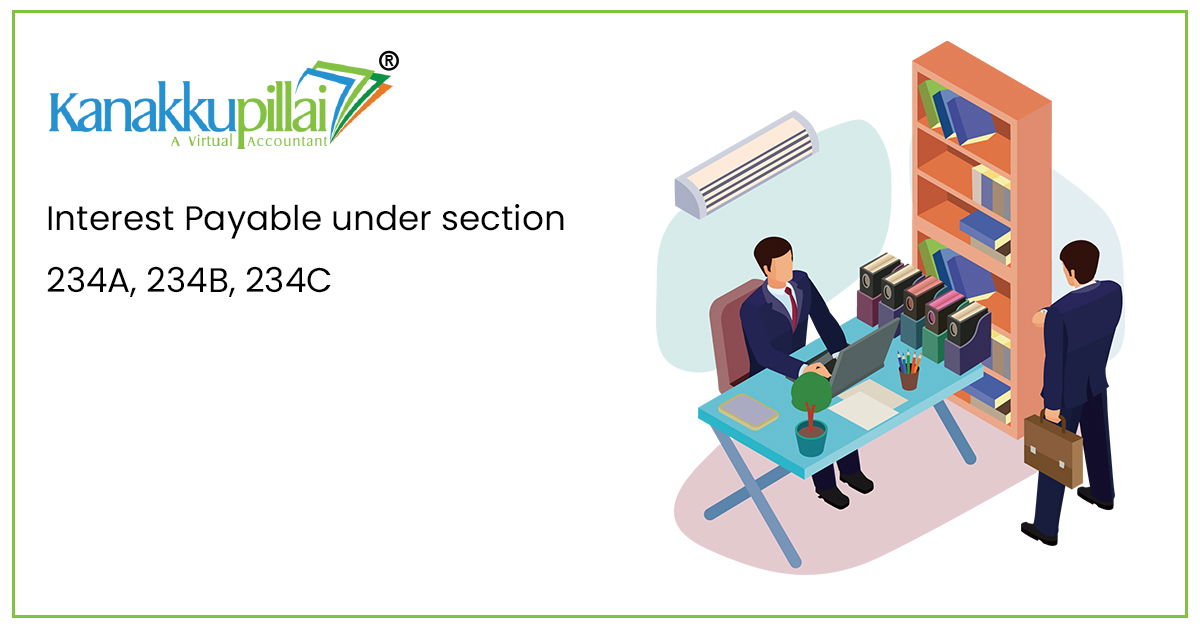Filing an Income Tax Return on time is a statutory obligation laid down by the Income Tax Act, 1961. Non-filing your tax return comes with penalties that are charged monthly. The penalties are imposed in the form of simple interest on a monthly basis and laid out in sections 234A, 234B, and 234C of the Income Tax Act, 1961.
In this blog, we will understand the interest payable under sections 234A, 234B, and 234C of the Income Tax Act, 1961, along with the process of calculating it.
What is Section 234A?
Section 234A of the Income Tax Act, 1961, penalises taxpayers who file their Income Tax Return after the due date.
This section applies if you are liable to pay income tax to the government. If your income exceeds the specified threshold and you do not file your Income Tax Return by the due date – usually 31st July, but this year extended to 30th September – the interest will be charged on any unpaid tax.
How is the interest calculated?
- The rate of interest under Section 234A is 1% simple interest per month or part of the month on the tax due. The interest is calculated for each month or part of a month from the due date until the date you file the return. Therefore, even if you file the return just a few days late, the interest for the entire month will be charged.
- For example, if your tax due is ₹10,000 and you delay filing your return by two months, the interest would be calculated as:
-
- Interest = ₹10,000 × 1% × 2 months = ₹200
-
- The interest will be added to your total tax payable.
What is Section 234B?
The Income Tax Act, 1961, requires taxpayers to pay taxes in advance, based on the estimated income for the year, through advance tax instalments. Section 234B applies:
- If you have underpaid advance tax or,
- Failed to pay it entirely.
What is advance tax?
Advance tax is the payment of the income tax paid in instalments throughout the financial year when the total tax liability of the taxpayer increases by ₹10,000. If you fail to pay advance tax, or you underpay it, you will be liable to pay interest under Section 234B.
The section applies when you don’t pay the tax due or make insufficient advance payments; interest will be charged from the start of the assessment year (April 1st) till the date of filing your return.
How is the interest calculated?
- The rate of interest under Section 234A is 1% simple interest per month or part of the month on the tax due on the amount of underpaid or unpaid advance tax.
- The interest is calculated from April 1st until you pay the dues in full.
Example of Section 234B:
If your total tax for the year is ₹50,000, you are required to pay ₹12,500 in four quarterly instalments. However, you forgot to pay the instalment in the first quarter. By the time you pay the balance in full by March 31st, the tax due has accumulated interest for the delayed period.
- The interest is applicable for six months (from April to September):
-
- Interest = ₹50,000 × 1% × 6 months = ₹3,000
This ₹3,000 would be added to your tax due, increasing your overall liability.
What is Section 234C?
Section 234C provides for interest on the underpayment of the advance tax.
Specifically addresses the underpayment of advance tax in any of the quarterly instalments. It applies when the taxpayer has not paid the correct amount of advance tax by the due date of the instalment. In other words, Section 234C imposes interest if you pay less than required in any of the four quarterly instalments.
Advance tax must be paid in instalments during the year, usually by:
- 15th June – at least 15% of the total tax
- 15th September – at least 45% (cumulative)
- 15th December – at least 75% (cumulative)
- 15th March – 100% of total tax
When is Section 234C Applicable?
- Section 234C is invoked when there is a shortfall in paying the required advance tax in any of the four instalments.
- The interest under this section is applicable only to the instalment that has been paid less than required.
How is the interest calculated?
- The interest is charged at 1% per month or part of the month on the shortfall amount.
- The penalty applies for three months for the first three instalments, and one month for the last instalment.
Example of Section 234C:
Assume your total tax liability is ₹60,000, and you are required to pay ₹15,000 in each of the four instalments. However, in the first quarter, you pay only ₹10,000, falling short by ₹5,000. The interest for this shortfall is calculated as follows:
- Interest = ₹5,000 × 1% × 3 months = ₹150
This interest would be added to your final tax liability.
Exceptions for section?
You don’t have to pay interest under Section 234C if the shortfall happened because of:
- Capital gains
- Lottery or winning income
- Unexpected business income (for a first-time business)
- Certain dividend income
And if you have paid the full tax on such income by 31st March, or you pay at least 12% (by June) or 36% (by September) of the total tax, then no interest is charged for those instalments, even if you didn’t reach the 15% or 45% threshold.
How Can You Avoid Interest under Sections 234A, 234B, and 234C?
To avoid paying extra interest, you need to:
- File your returns on time
- Keep track of the deadlines and the latest updates
- Pay advance tax on time
- Pay the correct amount in each instalment
- Keep track of deadlines
- Consult a tax professional for a better understanding





